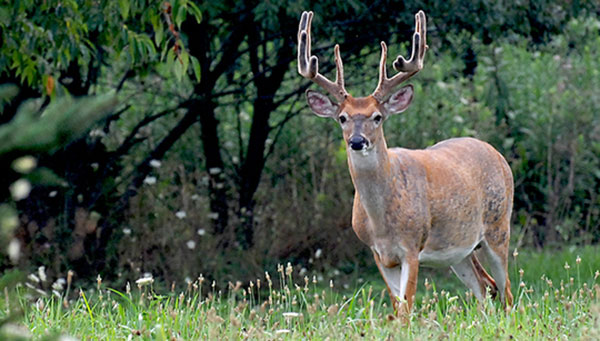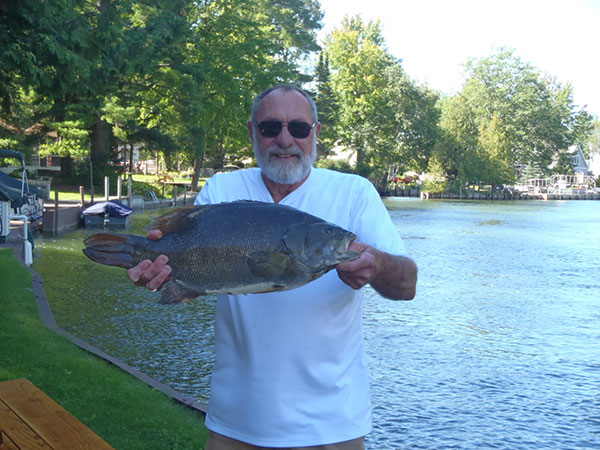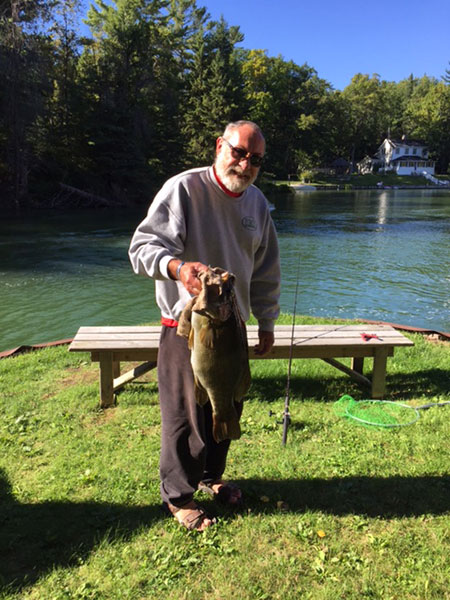- Details
The Michigan Department of Natural Resources today released its 2016 Michigan Deer Hunting Prospects report. The full text of the report follows.
2016 MICHIGAN DEER HUNTING PROSPECTS
 2016 Michigan Deer Hunting Prospects
2016 Michigan Deer Hunting Prospects
The leading reason many individuals participate in deer hunting is simply the opportunity to spend time outdoors with friends and family, but harvesting a deer is important to many deer hunters as well. No amount of hunting guarantees a harvest; however, preparation and hard work are keys to producing the best opportunity to see and take deer, or to mentor a new hunter through a safe and enjoyable season. The 2016 deer season is expected to be a successful year for many hunters.
- Details
(Provided by MDNR)
 Michigan Smallmouth Bass Record Broken Again!
Michigan Smallmouth Bass Record Broken Again!
Michigan's existing state record for smallmouth bass was broken Sunday by Robert Bruce Kraemer of Treasure Island, Florida.
A longtime angler with a cottage in Indian River, Cheboygan County, Kraemer said he's been fishing Michigan waters since 1965, but this is his first state-record catch. Using night crawlers for bait, Kraemer landed a 9.98-pound, 23.10-inch smallmouth bass while out on the Indian River.
"I usually spend June through the end of September up here at the cottage," Kraemer said. "I've got some great fish stories and some nice fish, but nothing like this."
The record was verified by Tim Cwalinski, a Michigan Department of Natural Resources fisheries biologist in Gaylord.
The previous state record for smallmouth bass was set in October 2015 when Greg Gasiciel of Rhodes, Michigan, landed a 9.33-pound, 24.50-inch fish from Hubbard Lake in Alcona County.
Prior to Gasiciel's catch, the smallmouth bass state record had stood since 1906. That fish was a 9.25-pound, 27.25-inch fish from Long Lake in Cheboygan County.
"In just the last four years, anglers have caught a total of 16 state-record fish, a remarkable number of big fish in a relatively short time," said Jim Dexter, chief of the DNR Fisheries Division. "This is just more evidence that Michigan is home to a healthy, robust fishery - a resource and sporting opportunity that continues to draw people from all over."
Kraemer, the new smallmouth bass state record-holder, agreed.
 Robert Bruce Kraemer of Treasure Island, Florida"I keep coming back to Michigan for a lot of reasons," he said. "The weather, the clear, cold water, good fishing - it's just nice up here."
Robert Bruce Kraemer of Treasure Island, Florida"I keep coming back to Michigan for a lot of reasons," he said. "The weather, the clear, cold water, good fishing - it's just nice up here."
Michigan fishing state records are recognized by weight only. To qualify for a state record, fish must exceed the current listed state-record weight and identification must be verified by a DNR fisheries biologist.
For more information on fishing in Michigan, including other state-record catches, visit michigan.gov/fishing.
- Details
(Provided by MDNR)
Young hunters, ages 16 and younger, once again will have the opportunity to get a free junior deer hunting license at all Meijer stores in Michigan Sept. 9 and 10.
Youths must be accompanied by an adult, and should print out and bring the free junior deer hunting license coupon to the store's sporting goods department.
The coupon is valid for a single junior deer hunting license, a $20 value, or mentored youth hunting license. Those who hunt in Michigan also must purchase a base license, which costs $6 for youths ages 10-16. The base license allows hunters to hunt small game and purchase additional hunting licenses. The mentored youth hunting license, valid only for hunters under the age of 10, includes a base license and does not require separate purchase of the base license.
- Details
(Provided by MDNR)
The Michigan DNR Commission will hear information on potential fishing regulation changes regarding commercial bait, bow and spear fishing, and reptile and amphibian possession at a Sept. 8 meeting.
The regulations to be discussed are part of multiple Fisheries Orders which the DNR uses to protect Michigan's aquatic resources. The Fisheries Orders on the agenda are 201, 216, 219 and 224.
Fisheries Order 201 sets fishing regulations on waters within the Big Island Lake Complex in Schoolcraft County. (http://www.michigan.gov/documents/dnr) The DNR proposes to add several lakes that were inadvertently omitted on the list of waters covered under this order. These changes should help clarify coverage of the special regulations.
- Details
(Provided by MDNR)
The Michigan DNR Law Enforcement Division is actively seeking recruits for its next conservation officer academy, which begins July 16, 2017, at the Michigan State Police Training Academy in Dimondale.
"The DNR, an equal opportunity employer, is seeking a diverse applicant pool, including military veterans," said Sgt. Jason Wicklund, recruit school commander.
Certain criteria apply. All recruit applicants must:
- Be able to lawfully possess a firearm in Michigan.
- Be a United States citizen.
- Be at least 21 years of age before graduation from the academy.
- Become a resident of the state of Michigan by completion of the Probationary Training Program.
- Possess a valid Michigan driver's license.
- Possess a satisfactory driving record.
- Possess a clean criminal record absent of any felony convictions.
- Submit to a thorough background investigation measuring the applicant's suitability for law enforcement work.
- Be able to pass the MCOLES physical fitness test.


